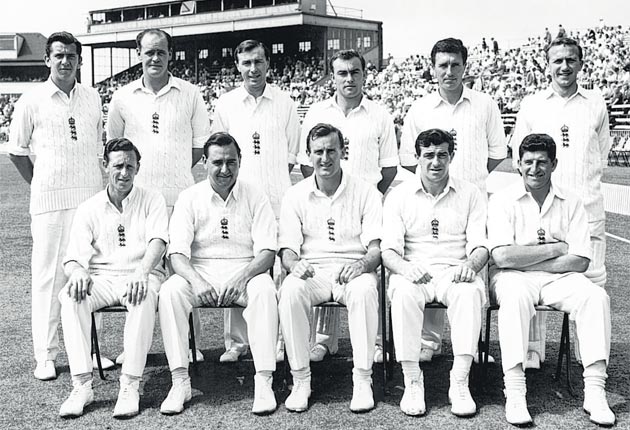Keith Andrew: Highly respected cricketer who captained Northamptonshire during the most successful period in their history

Your support helps us to tell the story
From reproductive rights to climate change to Big Tech, The Independent is on the ground when the story is developing. Whether it's investigating the financials of Elon Musk's pro-Trump PAC or producing our latest documentary, 'The A Word', which shines a light on the American women fighting for reproductive rights, we know how important it is to parse out the facts from the messaging.
At such a critical moment in US history, we need reporters on the ground. Your donation allows us to keep sending journalists to speak to both sides of the story.
The Independent is trusted by Americans across the entire political spectrum. And unlike many other quality news outlets, we choose not to lock Americans out of our reporting and analysis with paywalls. We believe quality journalism should be available to everyone, paid for by those who can afford it.
Your support makes all the difference.Cricket's wicketkeepers come in two types: the extrovert acrobats and the quiet, unnoticed ones who do it all with anticipation and deft glovework.
Keith Andrew was firmly in the latter category, so much so that his status among the fraternity of keepers has always been higher than it was with the selectors, who awarded him only two England caps. He was the early inspiration for Bob Taylor, who kept for England in the Botham years, and his last pair of gloves was bought at auction by Jack Russell.
Shortly before his death in 1979, "Tiger" Smith, England keeper before the First World War, offered his opinion: "Alan Knott and Godfrey Evans gave England great service, yet neither had the class of Keith Andrew or Bob Taylor behind the stumps."
Andrew's unshowy approach was in keeping with his down-to-earth childhood in Oldham. He was born in 1929, the son of a mill-working mother and a father whose prosperous family did not approve of the marriage. His father left but the young Keith, an only child, worked hard at school and later at evening classes to qualify as a mechanical engineer. He played his cricket at the Werneth club, being selected for a Central Lancashire League representative XI, where his keeping to the unusual chinamen of the Australian George Tribe caught the eye. Tribe joined Northamptonshire, and Andrew followed him.
His first county season was 1954, alongside another young Lancastrian, the fast bowler Frank Tyson, and the two of them were selected for that winter's tour of Australia. Tyson was the star of England's victory Down Under, but the young Andrew had a tour that effectively destroyed his England career. For the first Test, at Brisbane, he was a late replacement for Godfrey Evans, and in an innings defeat he unfairly took much of the blame for an inept team performance in the field. He played only once more for England – nine years later.
At Northampton he perfected his craft. In 1965, across seven matches, he set a world record by keeping for almost 45 hours and 900 overs, not conceding a bye while 2,132 runs were scored – at the same time as skippering the side. Such was his good-humoured modesty, however, that he turned the achievement back on his bowlers. "No wonder I don't concede any byes," he chided them. "You guys can't get past the bat."
For five years, from 1962 to 1966, he captained Northamptonshire, and they were the most successful years in the county's history. As Norman Yardley the former England captain, wrote, "His quiet, gentle ways blended the useful, rather than spectacular, players into a fine fighting unit." He took over when the team was at the foot of the table, yet when they completed their programme in 1965 they were top of the pile, heading for the only championship in the Cinderella county's history. Alas, it was not to be; they were pipped by rivals Worcestershire who benefited from a freak declaration in their penultimate match.
As a kindly father figure he nurtured the emerging genius of the overweight Colin Milburn, telling him that he would never play for England unless he lost weight: "Why don't you drink halves instead of pints?" A few days later the big man hit 150 in three hours and, when Andrew offered him a drink, he took his skipper's advice: "I'll have two halves, please, guv."
"He had a way with every member of the side," Milburn said, "and he could read a match as well as any skipper I played under."
After cricket Andrew had an unsuccessful spell in business, then he threw himself for 20 years into the National Cricket Association, first at Old Trafford, then at Lord's, where he became Chief Executive and developed a national structure of coaching. He believed passionately that cricket was a game for all and that its full range of skills and its special warmth needed to be preserved. In particular he lamented the decline of spin bowling in the English game and the modern tendency to downgrade the importance of the wicketkeeper: "It's like assembling an orchestra and getting some bloke to fill in on first violin."
He leaves a wife, Joyce, whom he married ten days before he left for Australia in 1954, and two children. His son Neale is an accomplished sculptor whose work includes larger-than-life figures of Steven Redgrave and Harold Larwood. Like his father, he is too self-effacing to gain the recognition he deserves. As John Arlott wrote, "Few cricketers of Keith Andrew's considerable gifts can have been quite so modest."
Keith Vincent Andrew, cricketer: born Oldham 15 December 1929; played for Northamptonshire (1953-66, captain 1962-66), two Tests for England (1954, 1963); married 1954 Joyce Lancaster (one son, one daughter); died 27 December 2010.
Join our commenting forum
Join thought-provoking conversations, follow other Independent readers and see their replies
Comments